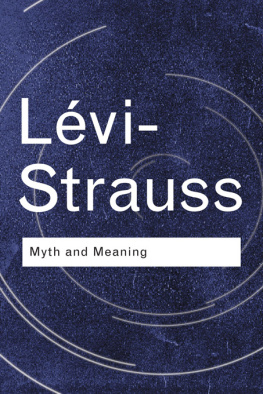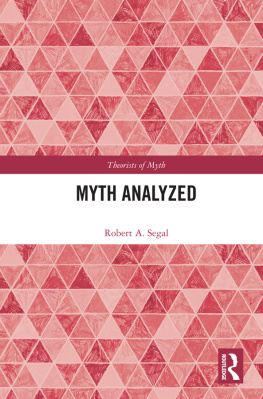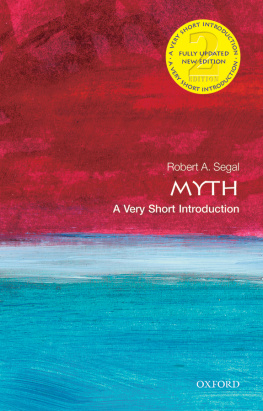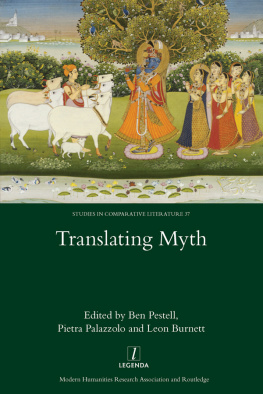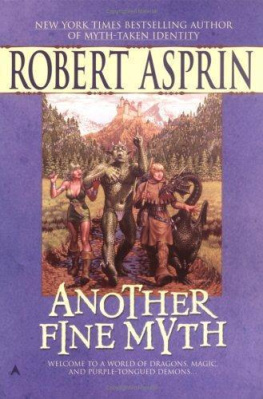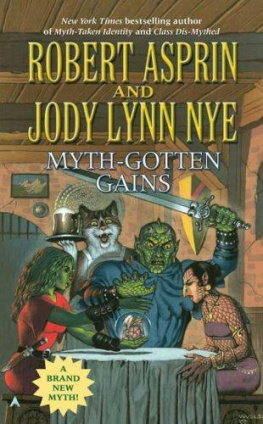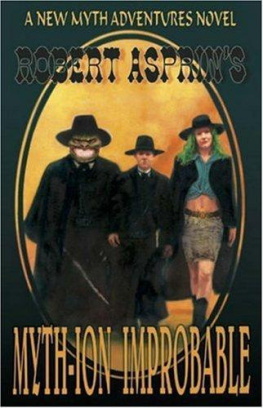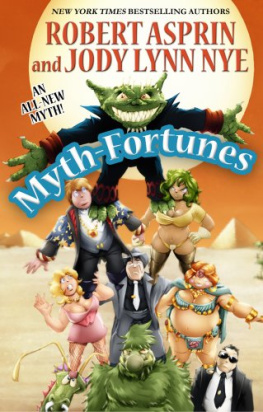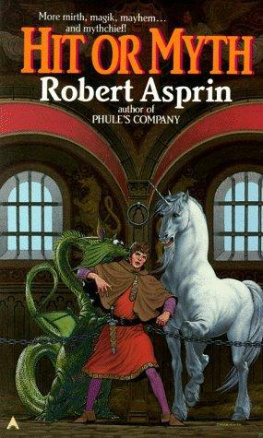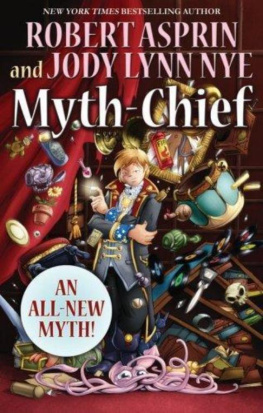MYTH AND MEANING
Ever since the rise of science and the scientific method in the seventeenth century, we have rejected mythology as the product of super-stitious and primitive minds. Only now are we coming to a fuller appreciation of the nature and role of myth in human history. In these five lectures originally prepared for the CBC, Claude Lvi-Strauss, one of the worlds greatest living thinkers, offers the insights of a lifetime spent interpreting myths and trying to discover their significance for human understanding.
The lectures begin with a discussion of the historical split between mythology and science and the evidence that mythic levels of under-standing are being reintegrated in our approach to knowledge. In an extension of this theme, Professor Lvi-Strauss analyses what we have called primitive thinking and discusses some universal features of human mythology. The final two lectures outline the functional relationship between mythology and history and the structural relationship between mythology and music.
Combining history, anthropology, and philosophy, this book provides a broad and penetrating perspective on the contemporary western world.
CLAUDE LVI-STRAUSS , Professor of Social Anthropology at the College de France, is the author of many distinguished works, among them The Elementary Structures of Kinship, Tristes Tropiques, Totemism, The Savage Mind, The Raw and the Cooked, From Honey to Ashes, and Structural Anthropology.
Myth and Meaning
Five talks for radio by Claude Lvi-Strauss

University of Toronto Press 1978
Toronto Buffalo London
Library of Congress Cataloging in Publication Data
Lvi-Strauss, Claude.
Myth and meaning.
(Toronto ; Buffalo : University of Toronto Press,
[1978])
Talks were broadcast on the CBC Radio series, Ideas, in December, 1977.
1. Structural anthropology Addresses, essays, lectures. 2. Mythology Addresses, essays, lectures.
3. Philosphy, Primitive Addresses, essays, lectures. I. Title.
GN 362. L 47 301.21 78-5212
ISBN 0-8020-2 3 20-7
ISBN 0-8020-6348-9 pbk.
The 1977 Massey Lectures
Ever since the advent of science in the seventeenth century, we have rejected mythology as a product of superstitious and primitive minds. Only now are we coming to a fuller appreciation of the nature and role of myth in human history. In these five lectures, the distinguished social anthropologist, Claude Lvi-Strauss, offers the insights of a lifetime spent interpreting myths and trying to discover their significance for human understanding.
Entitled Myth and Meaning, the talks were broadcast on the CBC Radio series, Ideas, in December 1977. They were assembled from a series of lengthy conversations between Professor Lvi-Strauss and Carole Orr Jerome, producer in the Paris bureau of the CBC . The programs were organized by Geraldine Sherman, executive producer of Ideas, and produced by Bernie Lucht.
The lectures have been expanded for publication to include some material which, for reasons of time, could not be used in the original broadcasts. The spoken words have been minimally edited to make them conform to the more rigid conventions of print. Carole Orr Jeromes main questions to Professor Lvi-Strauss, which helped shape the course of the lectures, were as follows:
CHAPTER ONE
Many of your readers think that you are trying to bring us back to mythical thought, that we have lost something very precious and that we must try to gain it back. Does this mean that science and modern thought must go out the window and that we must go back to mythical thought?
What is structuralism? How did you arrive at the idea that structural thought was a possibility?
Is it necessary to have order and rules to have meaning? Can you have meaning in chaos? What do you mean that order is preferable to disorder?
CHAPTERS TWO AND THREE
There are those who say that the thinking of so-called primitive people is inferior to scientific thinking. They say that it is inferior, not because of a matter of style, but because, scientifically speaking, it is wrong. How would you compare primitive thought with scientific thought?
Aldous Huxley, in his discussion in The Doors of Perception, said that most of us use only a certain amount of our mental powers and the rest of them are completely shut away. Do you feel that in the kind of lives we lead today, we are using less of our mental capacities than the people you write of who thought in a mythical fashion?
Nature shows us a variegated world, and weve tended to pick up on the differences between us rather than the similarities in the development of our cultures. Do you think we are developing to a point where we can start closing many of the divisions that exist between us?
CHAPTER FOUR
There is the old problem of the investigator who changes the subject of his investigation by simply being there. In looking at our collections of mythological stories, do they have meaning and order of their own, or has order been imposed by the anthropologists who have collected the stories?
What is the difference between the conceptual organization of mythological thinking and that of history? Does the mythological telling of a story deal with historical facts, then transform them and use them in another way?
CHAPTER FIVE
Could you talk in general about the relationship between myth and music?
You have said that both myth and music stem from language but evolve in different directions. What do you mean by this?
Contents
1
The Meeting of Myth and Science
2
Primitive Thinking and the Civilized Mind
3
Harelips and Twins: The Splitting of a Myth
4
When Myth Becomes History
5
Myth and Music
MYTH AND MEANING
An Introduction
Although I am going to talk about what I have written, my books and papers and so on, unfortunately I forget what I have written practically as soon as it is finished. There is probably going to be some trouble about that. But nevertheless I think there is also something significant about it, in that I dont have the feeling that I write my books. I have the feeling that my books get written through me and that once they have got across me I feel empty and nothing is left.
You may remember that I have written that myths get thought in man unbeknownst to him. This has been much discussed and even criticized by my English-speaking colleagues, because their feeling is that, from an empirical point of view, it is an utterly meaningless sentence. But for me it describes a lived experience, because it says exactly how I perceive my own relationship to my work. That is, my work gets thought in me unbeknown to me.
I never had, and still do not have, the perception of feeling my personal identity. I appear to myself as the place where something is going on, but there is no I, no me. Each of us is a kind of crossroads where things happen. The crossroads is purely passive; something happens there. A different thing, equally valid, happens elsewhere. There is no choice, it is just a matter of chance.
I dont pretend at all that, because I think that way, I am entitled to conclude that mankind thinks that way too. But I believe that, for each scholar and each writer, the particular way he or she thinks and writes opens a new outlook on mankind. And the fact that I personally have this idiosyncracy perhaps entitles me to point to something which is valid, while the way in which my colleagues think opens different outlooks, all of which are equally valid.
Next page

